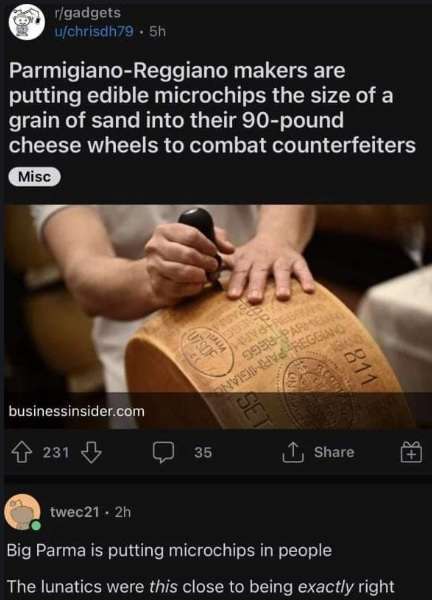The Volokh Conspiracy
Mostly law professors | Sometimes contrarian | Often libertarian | Always independent
"Big Parma Is Putting Microchips in People"

Spotted online. The BusinessInsider story is real, though it (and the original Wall Street Journal article) notes that the chips are being put into the outside labels that are unlikely to actually be eaten, though apparently they have to be food-safe just in case.
Editor's Note: We invite comments and request that they be civil and on-topic. We do not moderate or assume any responsibility for comments, which are owned by the readers who post them. Comments do not represent the views of Reason.com or Reason Foundation. We reserve the right to delete any comment for any reason at any time. Comments may only be edited within 5 minutes of posting. Report abuses.
Please to post comments


Why do I think that this is going to backfire -- badly...
And why can't you put counterfeit chips into the counterfeit cheese? Or simply re-use the actual legitimate ones?
This reminds me of the plan that a gasoline company had to make it's cheapest gas radioactive and then to look for radiation in the premium tanks of gas stations -- to prove that they were selling regular at the premium price. A wise engineer discouraged that one...
You could put counterfeit chips into the counterfeit cheese. The point is to increase the cost/burden of counterfeiting - presumably by more than you're increasing the cost/burden of your own manufacturing.
The better fuel analogy might be the dye that they add to "agricultural" and other low-tax or no-tax fuels.
I would assume the genuine chips have a unique serial number, and perhaps even something like a cryptographic hash/signature/identifier (whatever the correct term is) that can be used to confirm the origin of the wheel.
Public key cryptography, to create digital signatures. If they were to switch from selling wheels to selling blocks of cheese, they could take advantage of block chain technology. Then later someone could reinvent the wheel.
They do use blockchain technology here. It's not clear why (unless it's just for buzzword compliance), though, or why there should be a microchip rather than a printed QR code or human-readable serial number.
I don't think NFC or similar protocols make it feasible to have a secure enclave and per-chip PKI certificate. If the chip isn't responding to random challenges, it's probably spitting back a constant value, which means it can be cloned or forged easily.
That's the obvious application of blockchain: you can look up that constant ID in a ledger and check that Joe Cheesy is really the distributor who bought that wheel. But there's no obvious reason that needs to be distributed rather than centralized, or why it needs to use an RFID chip and reader to provide the unique ID for the ledger.
It's a joke, but your reflexes were fast enough to catch it before it went over your head.
To generate a fixed number for each wheel and place it on the label so that it could be checked against a ledger would allow a cheese counterfeiter to buy legitimate wheels and then sell the originals and many counterfeits of each in different transactions - the number on the label adds only a slight complication to the counterfeiting if they're already printing fake labels.
If the chip is difficult to counterfeit, then the cost to the counterfeiters is increased. If it provides verifiable data that includes the date produced and something like public key cryptography to verify the author of that data, then it would also prevent reuse of chips.
The use of chips instead of printed information might allow for more rapid scanning of shipments by whatever inspectors would be looking for counterfeits. Even scanning bar codes or QR codes might require moving each wheel to make the code visible.
Cheese counterfeiting seems weird and now I want to see a blockbuster movie about cheese counterfeiting. Like Lock, Stock and Two Smoked Goudas or The Italian Cheese Job.
.... I laughed.
"Non-toxic if swallowed and too small to be a choking hazard" is more accurate than edible.
Eating a bowl of them would be mighty unpleasant, even with garlic butter and a stiff drink.
After yo momma eats a slice, then how will they tell the difference?
It’s the mark of the cheese.
It's OK, because "blessed are the cheesemakers". We can worry when it extends from dairy products to things like deviled eggs.
I just heard a podast about Parmigiano Reggiano. It is big business for both cheesmakers and lawyers!
The Parmigiano Reggiano website states that “Parmigiano Reggiano is a unique and inimitable cheese”.
If this P- R stuff can’t be imitated, or it is difficult to do so, wouldn’t the counterfeits all taste inferior (or have other inferior qualities) such that buyers would return the fake cheese?
I would expect that knock-offs are good enough that they could sell for a lesser price, but command a higher price by claiming to be authentic, thus profiteering at the expense of the original brand, which loses its cachet and can only command a lesser price because people think its quality has gone down or was never that good.
Its counter-feta
Ha! That comment is way better than gouda.